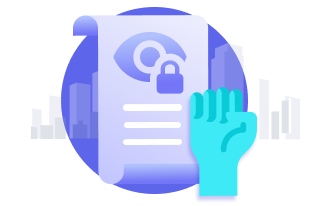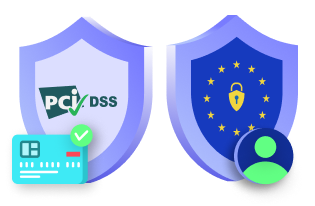Privacy rights are more crucial than ever as the world gets more connected. People need to have control over who can access their information as it is shared online in such large quantities. They should have the freedom to decide what personal data or information is shared with whom. Privacy rights help prevent the improper handling or exposure of users’ personal information.
However, privacy rights go beyond simply protecting user data. It allows freedom of expression, without worrying about discrimination or criticism.
The importance of privacy rights has increased as more and more of our lives are lived digitally. On the internet, people reveal their personal information, including addresses, phone numbers, and even their personal thoughts and emotions. Although the internet offers ease and connectivity, it also exposes users to new privacy risks.
The Right to Privacy gives users the power to manage their personal data, which includes the right to decide how their personal data is used, gathered, and shared.
In this article, we’ll examine the value of privacy rights and why it is necessary today.
Rights under privacy laws
Internet privacy rights and online safety precautions are important to consider when using technology. The right to privacy is a fundamental human right acknowledged by many international laws, such as GDPR, CCPA, LGPD, POPIA, VCDPA, etc. It is crucial for protecting the users’ freedom and interests.
The right to privacy is constantly at risk in the digital era, where corporations and other bodies gather and store data about people and monitor their activity online for their own benefit. It’s critical to be aware of privacy laws and take measures to safeguard the users’ data against any vulnerability and exercise caution while disclosing or using their personal information.
Here are the most commonly seen privacy rights granted to users in most privacy laws around the world:
- Right to know/be informed what personal information is collected about them
- Right to access personal information that has been collected about them
- Right to request correction if any inaccurate information is found
- Right to request deletion of any collected information
- Right to restrict or object to the use of information under certain circumstances such as if it was used for marketing purposes without their consent or profiling using automated means.
- Right to opt out of information processing
- Right to withdraw the consent given to process personal information at any time.
- Right to port personal information in a user-friendly format to another controller
- Right to no discrimination for exercising the user rights
Reasons why privacy rights are important
The protection of privacy is crucial for several reasons. They safeguard personal information, which is essential for a business if it collects user data. Here are the key reasons why privacy rights are important:
Protect personal information
Privacy rights protect the handling or manipulation of personal information. Businesses need personal information such as name, address, phone number, email address, and personal health data for various purposes, e.g. email finder for email marketing. Businesses must obtain this information lawfully, reasonably, and transparently. They also must honor the user’s right to access and update personal information.
Gain trust and loyalty
When you protect their personal information, you gain the trust of your users. They can freely share their contact details, location, and other personal information without fear of being targeted by cybercriminals or hackers. This will build a positive reputation for your business.
Honor freedom of expression
Freedom of expression is protected by privacy rights. People are more willing to speak up and defend their beliefs knowing that they are not going to be discriminated against for it.
Safeguard consumer rights
Additionally, privacy rights are crucial to safeguarding consumer rights. If businesses collect personal information from consumers, they should be open and honest about how they the data. Otherwise, they might be able to alter purchasing patterns or target consumers with unwanted advertising using the collected data. These data may contain details about our credit cards, past purchases, and preferences. It is not an ethical practice to collect data without providing them the right to opt out of it or to know what data is being collected.
Rights to intellectual property
A key element of intellectual property rights is privacy. Privacy rights ensure that people can profit from their ideas and inventions, and protect them from being used by others without permission. This applies to all of our patents, trademarks, and copyrights.
Protect reputation
Privacy rights are crucial because they protect users’ integrity and dignity. If their personal information is mishandled, they could become victims of fraud or identity theft, which eventually might ruin a business’s reputation
Provide medical care rights
If you are in the healthcare business, the right to privacy is crucial for people who are seeking medical care. Patients are less likely to seek the medical help they need if they fear that their personal information will be disclosed to insurance companies or employers. Thanks to the right to privacy implemented by many laws, healthcare providers cannot use or share patients’ personal information, including details about their insurance coverage, genetic makeup, and medical history, without consent.
Protect from data breaches
Another reason why honoring privacy rights is important for businesses is because it helps protect them from data breaches and cyber-attacks which could cost them millions of dollars in lost revenue and brand reputation damage. If hackers steal sensitive information such as credit card numbers or Social Security numbers from your database, then they could use it to steal money from your customers’ bank accounts or impersonate them when making purchases online.
Avoid legal action
Businesses that violate consumer privacy rights are at risk of being sued by individuals or groups who believe they have been harmed by such actions. Legal action can be costly for both parties involved and can lead to negative publicity for the business involved in such lawsuits. Privacy laws vary by state and country, but all businesses should work hard to avoid violating consumer privacy rights as much as possible
How to ensure the privacy rights of users?
- Ensure that personal data is only used for the purposes it was collected for.
- Only collect information that is necessary for conducting your business.
- Be transparent as to how data will be used.
- Implement a consent management system to obtain user consent before collecting or disclosing their information.
- Give users access to their data and make corrections when requested. Make sure you have a proper channel to process such requests from users.
- Maintain high levels of security for the user data.
- Regularly review your systems, such as how data flows through the organization.
All businesses should value privacy rights because they enable them to protect the security of users’ personal data. You can keep their information secure and contribute to the protection of the freedom and interests of users by honoring their privacy rights, thus, growing your business.
Author bio: Sarah Markinson is a marketing consultant who specializes in B2B marketing. Her insightful blogs on email marketing and business growth have made her well-known in the digital sales community. In her free time, Sarah contributes to animal rights causes and enjoys creative writing.
Disclaimer: This article is for general informational purposes only and should not be taken as legal or professional advice. The views and opinions expressed in this article are solely those of the author and do not necessarily reflect the views of our organization. We do not endorse any products or services mentioned in the article.







